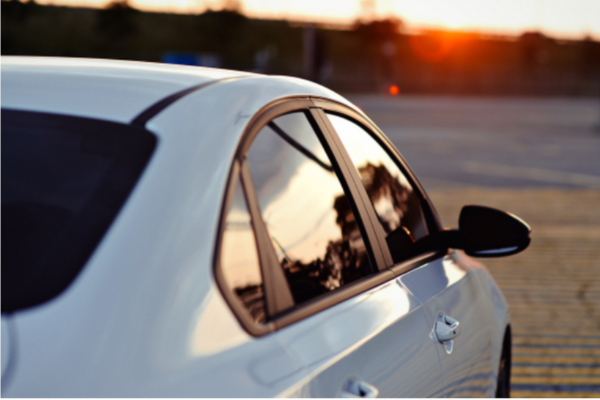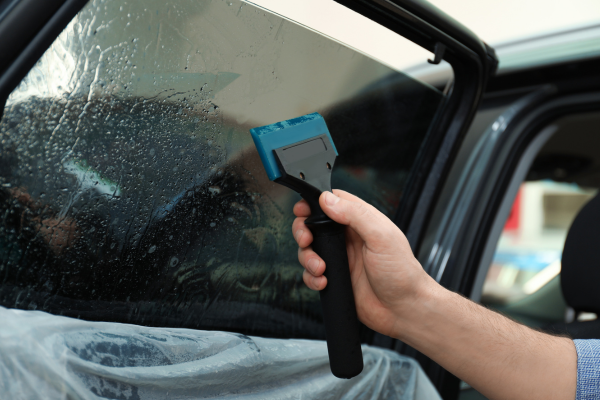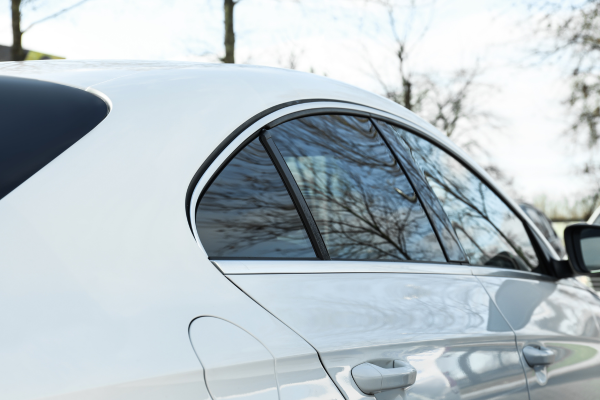
Fans of tinted windows say a lot about the benefits of car window tinting. Some of them give a stylish look and improve visibility by reducing glare. Other than these, there are numerous reasons for car window tint. Car window tinting is one of the many things people overlook because many cars come with tinted windows straight out of the factory.
If your car didn’t have tinted windows when it came to your house, there are multiple reasons for car window tinting. Some people opt for window tinting because of medical reasons. Skin cancer, melanoma, and sunburn are some of the health concerns that arise due to the heat.
What is Car Window Tinting?

Most modern automobiles come with safety glass treated with a coating or another method to provide some window tinting to block harmful UV rays. Adding a thin window film to the inside surface of your car’s windows is known as aftermarket window tinting. This substance darkens a car’s windows, blocking UV rays and reducing headlight and sun glare.
Film for car windows comes in a range of colors and materials. Visible light transmission is a common performance indicator used to evaluate window tinting for cars. A darker hue of automobile tinting transmits less light on average. The tint influences how much light enters the car, helps to reduce glare, and impacts how well a driver can see out of the window.
Window Tinting Laws Determined by States
State regulations govern the allowable degree of opacity for automotive glass tinting. These regulations are primarily established with safety considerations aimed at improving visibility for drivers and law enforcement officers during vehicle operations.
To determine the appropriate level of window tinting for your car, it’s essential to consult your state’s Department of Motor Vehicles. It’s where you’ll find information on the specific regulations, including permissible levels of light transmission. Once you have identified the permissible levels, you can select the suitable window tint film for your vehicle.
State statutes typically dictate the permissible tint level for each window of passenger vehicles, with particular emphasis on front windshields. In fact, all states impose restrictions on tinting for front windshields.
Window Tinting Laws According to Various States
Most states also place restrictions on the degree of tint that can be applied to a vehicle’s windshield and front side windows. For a sample of state laws regarding tinting, consider the following:
- Seven states, Alaska, California, Delaware, Iowa, New York, Pennsylvania, Rhode Island, and the District of Columbia, require 70% light transmission for tinted windows.
- Connecticut mandates a 65% light transmission and requires a window tint compliance sticker from the state’s Department of Motor Vehicles.
- New Mexico permits the darkest tinting for front side windows, allowing a 20% light transmission.
- Vermont, New Hampshire, and New Jersey prohibit aftermarket tinting on windshields and front-side windows.
It’s important to note that regulations for car window tinting may vary for SUVs and minivans compared to sedans and coupes. Additionally, commercial vehicles may be subject to different or additional requirements and restrictions.
Keep in mind that state laws regarding automotive window tinting can change annually. Reputable window tinting companies that provide tint installation should be well-versed in the current regulations in your area. However, it’s crucial to remain aware that your compliance with tinting laws may change if you relocate to a different state.
What are the Various Reasons for Car Window Tint?
Keeps Your Car Looking Good Inside
The sun can damage your car’s insides over time, making the seats fade and leather wear out. Tinted windows can stop this, keeping your car looking suitable for longer and helping it sell for more money when you’re ready.
Less Glare
Sun glare when you’re driving is annoying and dangerous. It can make it hard to see and give you headaches. Tinted windows stop this glare, making driving safer and more comfortable.
Stays Cooler
On hot days, your car can become an oven. Tinted windows keep the heat out, so it’s cooler. It means you don’t have to blast the A/C as much, saving gas and money.
More Privacy
Tinted windows mean people can’t see inside your car as easily. It’s great for safety and stops criminals from peeping inside to decide if they want to break in.
Saves Money on Gas
A cooler car needs less A/C, so you spend less on gas. Less time at the gas station means more time for fun stuff.
Protects from Harmful Sun Rays
Tinted windows block harmful sun rays that can cause skin cancer. It’s an easy way to stay healthy.
Safer in Accidents
If you’re in a car crash, tinted windows keep the glass from shattering into sharp pieces that can hurt you. It’s one more way tinting keeps you and your family safe.
Medical Reasons for Car Window Tinting
Lupus
Lupus is a sickness where your body mistakenly harms different parts inside you. Many people with lupus can’t be in the sun for too long because it makes them feel worse, with sore skin, achy joints, fever, and extreme tiredness.
Cockayne’s Syndrome
Some kids are born with a rare illness called Cockayne’s syndrome. It makes them grow and develop slowly, affects their brains, and age faster. Sunlight can hurt their skin and eyes, so they have to wear sunscreen and sunglasses.
Bloom Syndrome
Some people are born smaller than usual and have a higher chance of getting cancer. Sunlight can make their skin red and show tiny blood vessels. They’re also more likely to get skin cancer.
Solar Urticaria
It’s like an allergy to the sun. When people with this issue go outside in the sun, they get very itchy, and their skin burns. It’s uncomfortable, but it usually goes away after about an hour.
Protoporphyria
This condition makes your skin hurt when it’s sunny outside. It happens because something builds up in your skin. Sunlight can be very painful for people suffering from protoporphyria.
Conclusion
Looks are one of the reasons for car window tint; they also shield your car from intense sun rays, cut down on glare, and boost safety. It’s not only the front window that needs safeguarding – window film is compelling for all your car’s windows.
Whether you want to block out blinding sunlight or enhance security, our car window tinting service is up to the task, and we do it without breaking the bank. We’re pleased to provide high-quality options for every budget, with no surprise expenses.
Reach out to us today at Bravo Protection Products to learn more.
FAQs
-
Does car window tint reduce noise?
While window tint can minorly impact external noise, it won’t reduce the noise from the road that comes through the tires or the vehicle’s structure.
-
Do tinted windows block vision?
Window tint is made for seeing out from inside your vehicle, but it does slightly reduce visibility. It becomes more noticeable at night or when driving through tunnels. If your night vision isn’t great, tinted windows may not be the best choice for you.
-
Which tint is best for the night?
- Ceramic tints are your top choice if you want to ensure clear visibility at night. They don’t diminish the amount of light that enters the car or create reflections or distortions that can hinder your vision.



